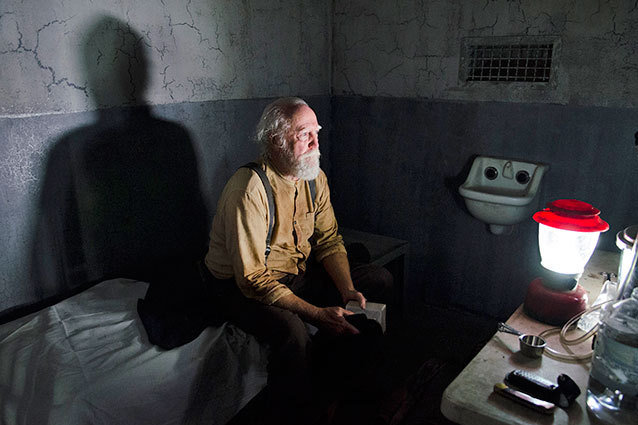 Gene Page/AMC
Gene Page/AMC
We swoon over Daryl. We fawn over Michonne. We identify with Carol. We pity Rick. We root for Glenn and Maggie. And we can’t stand Carl. But when’s the last time anybody said a word about Hershel? Yes, Hershel. The rock of Walking Dead. Since we met him back in his farming days, Hershel has provided the audience with a rare source of stability. For these past two years, we have been able to cling to the wise, kind, and level-headed veterinarian through all the chaos — in the darkest, most harrowing of episodes, we can take ease in the presence of Hershel. “Oh good,” we sigh when he hobbles into a scene. “He’s here. Something is going to make sense now.”
Since Hershel kicked his habit for the spirits, that has been the case. He’s doled out proverbs and compassion, never allowing pride or resentment to steer his actions, acting instead in the interests of what we can all identify as a “good.” Unlike Carol’s (who we miss already), Hershel’s good is not controversial. His is one of obstinate humanity. He sees suffering, he sees incongruity, and he fixes it. Unlike Rick’s (who we could take or leave), Hershel’s good doesn’t waver. He always knows what to do. He doesn’t just abide by right and wrong, he understands their parameters. And then he brings them to life.
In “Internment,” we see Hershel brought to his most trying limits yet. Even with the loss of his friends and family members looming over him forever, his feats of strength this week seem like new, unprecedented torture. Hershel aims to contain the sickness that is spreading through the jail, to keep all patients alive and free of suffering. But this one-legged, gray-haired God-fearing man cannot accept the cruelties of the Earth upon which he lives — he loses resident after resident to the ailment, watching friends transform into zombies at a rapid rate. But he doesn’t stop.
He drives a knife into the head of his protegee, a young and kindly doctor with whom Hershel was beginning to identify. He sees a father bitten by his own undead child, turning quickly afterward into a monster all his own. He is forced to stare into the face of the young man who has been granted his daughter’s heart, whom he has come to think of as a son, as he chokes violently on his own blood. He rushes, on one leg, to obtain a breathing apparatus from a cannibalistic walker in order to save his surrogate son’s life. He wrestles with the zombie as it snaps repeatedly at his flesh, aching to take his life away. But he doesn’t stop.
And finally, after retrieving the oxygen tank for Glenn (thanks to a well-placed bullet into the head of the zombie, courtesy of his daughter Maggie… who chose her father’s life over the risk of destroying her boyfriend’s last hope at breathing, we might want to note) and bringing him back to stability, Hershel holes up in his cell, fans through the pages of his Bible, and begins to cry. Openly, loudly, and deeply. And he doesn’t stop.
We, along with just about everybody in the camp, take Hershel for granted. His unfolding heroism. His kempt responsibility. His ability to see through the bulls**t that haunts this collection of decaying human beings and always highlight the best course of action. Here, we are shown Hershel’s internal, the toll that this world, and his roll in it, has taken. Next week, we’ll probably see Hershel back in his old saddle, handing out wisdom, advice, and compassion. He doesn’t stop. Ever. And we all need to pay a little more mind to that.


